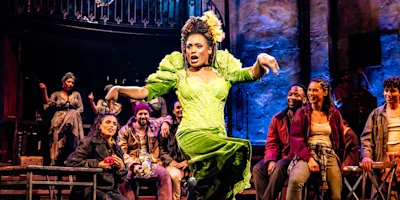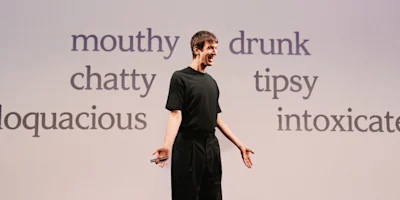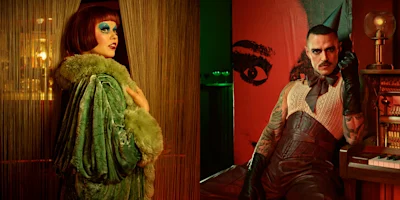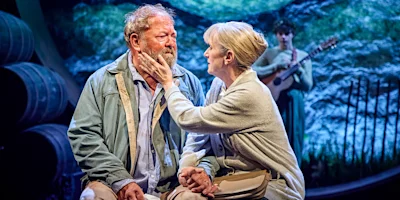
A complete guide to all the songs in 'Les Misérables'
Do you hear the people sing? Revolution rings out in thunderous anthems in the iconic, long-running West End musical Les Misérables, as students mount the barricades in 19th-century Paris and French citizens long for a better, fairer life.
Of course, Claude-Michel Schönberg and Alain Boublil’s stage adaptation of Victor Hugo’s seminal novel also features yearning love songs, comical gangsters, and an unforgettable prayer. It’s no wonder it’s one of the most beloved scores in musical theatre history, with breakout hits aplenty. Find out more about Les Misérables in the West End.
So, join us on a journey across the decades, from a desperate convict redeemed by the kindness of a bishop, through to a broken dream, unrequited love, an unrelenting manhunt, criminal scams, and a battle for the soul of a nation. At the end of the day, we’ll have covered every key moment of this musical masterpiece.
Book Les Misérables tickets on London Theatre.
“Prologue: Work Song”
Our grim introduction to the hero of Les Misérables: Jean Valjean, aka prisoner 24601, among his fellow downtrodden convicts. He’s served hard time simply for stealing a loaf of bread to save his starving family. Valjean thinks he’s finally free, but prison guard Javert will always see him as a convict. So, it transpires, will society. This effective opening number sets up the big themes of the show — and the duel between Valjean and Javert.
“Prologue: Valjean Arrested/Valjean Forgiven”
Valjean is immediately arrested for stealing silver from the Bishop’s house. But at his darkest moment comes a ray of light: the Bishop, instead of pressing charges, tells the police that he had given the silver to Valjean. This moment of salvation is a musical reprieve from the punishing misery, too.
“Prologue: What Have I Done?”
This is the major turning point for Valjean. As the Bishop states plainly: “I have bought your soul for God.” Here the lyrics are particularly evocative as Valjean castigates himself for acting like a “thief in the night… a dog on the run”. He decides to begin again — with a new name, a new story, and a new purpose.
“At the End of the Day”
It’s now eight years later, and there is still misery and injustice in France – as we hear from the embittered workers. This sets up another key character in the show, Fantine, who is constantly sexually harassed by the factory foreman and mistreated by the other women. Unfortunately, Valjean (now the factory owner and mayor) misreads the situation – something he will later bitterly regret.
“I Dreamed a Dream”
After those impressively efficient opening songs establishing the musical’s setting, plot and ideas, this ballad gives us some breathing space. Fantine confesses all to us: her memories of happier times, and the dream she had for life, all destroyed by the lover who abandoned her.
This stirring number transcends Les Mis, covered by everyone from Neil Diamond, Aretha Franklin and Elaine Paige to Susan Boyle in her viral audition for Britain’s Got Talent. Anne Hathaway delivered a hushed, intimate (and ultimately Oscar-winning) version in the Les Mis film.
“Lovely Ladies”
Without a social safety net, the now-unemployed Fantine slips easily into prostitution. The inevitability of that is illustrated by the song’s structure: we begin with the prostitutes and their clients, interspersed with Fantine, until she joins their ranks.
Her desperation undercuts their faux-cheeriness, and we end with a violent encounter – and the authorities, represented by the returning Javert as a policeman, taking the side of the wealthy client. Thankfully, Valjean is also back to intervene – yet in helping, he unintentionally reveals himself to Javert.
“Who Am I?”
Les Mis gives Valjean several dynamic soul-searching numbers. In this one, he must decide whether to sacrifice his new life – in which he’s in a powerful position to help others – in order to save the innocent man who is about to serve his sentence. It’s a song full of questions, punctuated by the repeated couplet summing up his dilemma: “If I speak, I am condemned/ If I stay silent, I am damned.” Who is he, ultimately? He is 24601, and he made a bargain with God.
“Come to Me”
It’s too late for Fantine, who is now on her deathbed – but calls out to her daughter, Cosette. Years later, we’ll hear this same haunting musical refrain in Eponine’s “On My Own”, linking the two generations of women. As Fantine dies, Valjean makes another defining promise: Cosette will live in his protection. Their brief duet bonds the two, but any chance at romance is immediately snuffed out.
“The Confrontation”
We have been building to this, and “The Confrontation” does not let us down. Valjean and Javert face off, furiously articulating their opposing points of view on justice, duty and whether a man can change his ways. Their differences are reflected in the musical counterpoint too: Valjean higher-pitched, lyrical and passionate, Javert lower, ploddingly rhythmical and implacable.
“Castle on a Cloud”
Meet Cosette, the daughter who Fantine gave everything to protect. Here we see the sad truth that the child is neglected and ill-treated, and, in this vulnerable solo, she too “dreams a dream” of a better life with her mother. But she’s soon interrupted by the vicious Madame Thenardier, who scorns the “ten rotten francs” Fantine sent them – although we know how much she sacrificed to obtain it. Needless to say the audience is immediately on Cosette’s side.

“Master of the House”
And yet… sometimes the Devil has the best tunes. The Thenardiers might be filthy crooks, but this is such a fun, naughty, raucous number – after a string of sad ones – that we’re more than happy to spend a bit more time in their company. Here we learn how they scam all their customers, and get a glimpse into the unhappy married life of Madame Thenardier, but at least we get a party along the way.
“The Waltz of Treachery”
Now we see that scamming in action, as the Thenardiers pretend to be heartbroken at the loss of their dear Cosette – and keep pushing up the price for Valjean to take her. It’s amusingly couched in a schmaltzy waltz tune, but we know the venal truth. Valjean gets the measure of them too. And this won't be the last time that he tangles with the Thenardiers.
“Look Down”
Following another time jump, here we get an echo of the prologue’s “Look Down” refrain, again sung by a downtrodden section of this unequal society. But it’s juxtaposed by the swaggering words of street kid Gavroche, and then by the rebellious talk of students Enjolras and Marius. Welcome to the revolution!
“The Robbery”
This action-packed number sets up our new tangle of relationships. Thenardier now runs a low-life criminal gang, including his daughter Eponine, who is secretly in love with Marius – but he spies Cosette, who has become a well-heeled lady, and is instantly smitten. More worryingly for Valjean, Thenardier (who has tried to rob them), recognises him, and so does Javert.
“Stars”
So far, we’ve only viewed Javert as an unreasonable antagonist. But now the musical gives him a soft, pensive song in which he can confide in the audience, explaining his personal faith and how it shapes his profession. He isn’t just an overeager policeman: he feels like he’s on a holy mission to maintain social order, and so Valjean must be caught. Ironically, this sentiment brings him closer to Valjean, also now a man of faith.
“Eponine’s Errand”
Poor Eponine. Not only does Marius completely disregard her as a romantic prospect, he now asks her to assist him in wooing the elegant Cosette (who she used to treat as a servant). It’s the ultimate humiliating friendzoning. You’ll hear Eponine and Marius’s duetting again later, in more tragic circumstances.
“Red and Black”
Vive la revolution! Enjolras’s rallying cry? “Red: the blood of angry men,/ Black: the dark of ages past./ Red: a world about to dawn,/ Black: the night that ends at last.” That’s interspersed with Marius’s love-at-first-sight bewilderment. In both cases, their world is changing forever. It’s a clever way to add a personal dimension to this political cause.
“Do You Hear the People Sing?”
So effective is this revolutionary call to action (which also acts as the musical’s finale) that it’s been taken up by real-life protestors – including in Turkey, Egypt, Taiwan, Hong Kong, Sri Lanka and Ukraine. Thank the clear-cut, repeated lyrics, the insistent beat, and the unquestionable principles.

“In My Life”
We switch back from politics to love, as the sheltered Cosette – via an exquisite silvery soprano line – expresses her confused feelings. Though Valjean adores her, there are too many secrets between them. In bursts Marius, matching her lyrical style, while poor Eponine can only watch on.
“A Heart Full of Love”
Cosette and Marius finally duet – awkwardly, adorably, finishing each other’s broken sentences. Although there are some lovely soaring vocals, the lyrical simplicity here speaks to their sincerity: Marius’s “I am lost” met with Cosette’s “I am found.”
“The Attack on Rue Plumet”
Uhoh. Marius isn’t the only one scoping out Valjean and Cosette’s house: Eponine meets Thenardier and his gang, planning to rob them. Eponine’s scream scares them away – but also makes Valjean think it’s time to run again.
“One Day More”
Surely the most epic ending to an act in musical theatre history. This mammoth number checks in with all our key characters, using counterpoint melodies as each uses their own distinct vocal lines. It’s an extraordinary feat, both a clever summary of where everyone has ended up at this key juncture and a gradually building, knockout moment in the show. “Tomorrow we’ll discover what our God in Heaven has in store” – or, in other words, you’d damn well better come back after the interval.
“Building the Barricade”
We begin Act II with the students constructing their infamous barricade. Marius is still distracted, however, as Eponine acts as go-between for him and Cosette. Meanwhile Javert prepares to infiltrate the rebels.
“On My Own”
This tortured ballad, with its big, wrenching key changes, is Eponine’s moment to express her anguish: however much she devotes herself to Marius, he simply does not love her back. “On My Own” only became Eponine’s number when the show was Anglicised, but Frances Ruffelle’s rendition established it as a breakout hit. Later, Lea Salonga used it when she was auditioning for “Miss Saigon”.
“At the Barricade”
Javert attempts to subvert the rebels’ cause – but Gavroche recognises him, and now Javert finds himself a captive, at the mercy of others’ whims.
“Little People”
Gavroche crows that he might be small, and underestimated, but he learns a lot close to the ground. It ties into the musical’s exploration of power dynamics. Right now, Gavroche is smaller than Javert, but he’s on top.
“A Little Fall of Rain”
Here’s that agonising reprise of Marius and Eponine’s duet – now sung with horror, pain and eventually acceptance as she dies in his arms (after being shot climbing the barricade), all while reassuring him that she delivered his letter to her love rival Cosette. I’m not crying, you’re crying.
“The First Attack”
The rebels win the first skirmish – but their enemy will be back. Meanwhile, Valjean finds himself in the extraordinary position of being asked to decide the fate of Javert. Again they’re at odds (philosophically and musically), as Valjean astonishes Javert by releasing him instead of killing him.
“Drink With Me”
A moment of calm amidst the fighting. In this gentle, evocative song, the rebels raise their glasses to happier times, and wonder what it will mean if they lose their lives to this cause. Marius also wonders if he can go on without Cosette.
“Bring Him Home”
Written to make the most of Colm Wilkinson’s incredible range, this shiver-inducing prayer has since been covered by numerous musicians, and is a favourite in auditions, concerts and talent shows – but it’s a big ask for anyone to sing it with the vocal effortlessness and God-given grace of Wilkinson. Here Valjean prays for Marius’s safety, for Cosette’s sake, offering up his own life instead. Again, that musical beauty is paired with relatively simple lyrics, letting the conviction of his words ring out. Discover more about actors who have played Jean Valjean in the West End.
“The Second Attack”
It’s all gone wrong. The people have not rallied to the rebels’ cause, and they’re running out of ammunition. Gavroche, cocky to the end, climbs the barricade to gather ammo from his fallen comrades – while reprising his “Little People” – and is tragically shot.
“Dog Eats Dog”
Where is Thenardier in all of this? Looting corpses, of course. One of those is Marius – but thankfully, he’s not quite dead, and Valjean has the chance to save him. After escaping Javert, who breaks with tradition by standing aside.
“Javert’s Suicide”
However, that merciful action destroys the code that Javert has lived by his whole life. Now it’s Javert’s turn for a big, rousing, soul-searching, Valjean-style number as he questions whether he was wrong all along. Referring back to his “Stars” song, he now finds the stars “black and cold”. Hopeless, he hurls himself into the river.
“Turning”
In this haunting number, which uses the same melody as “Lovely Ladies”, women recall the “children of the barricade” going off to fight for a new world – and dying for it instead. Nothing will ever change, they lament. The use of a familiar tune emphasises that feeling.
“Empty Chairs at Empty Tables”
Marius, beset with survivor’s guilt, surveys the empty tables at the ABC Café where his comrades used to sit. What, he asks, was their sacrifice for? It’s the lowest moment of the show: a shattering personal loss, as well as the end of their revolutionary dreams.
“Every Day”
Marius and Cosette reprise their “Heart Full of Love” tune as they reaffirm their commitment to one another: at least that has survived the slaughter. Valjean adds a counterpoint, realising that he needs to let Cosette go.
“Valjean’s Confession”
Yes, it’s “On My Own” again – although this time it’s just a riff as part of Valjean unburdening himself to Marius, confessing that he’s a convict on the run and that he must now leave Cosette for good. It brings our story full circle, as Valjean finally claims that old identity.
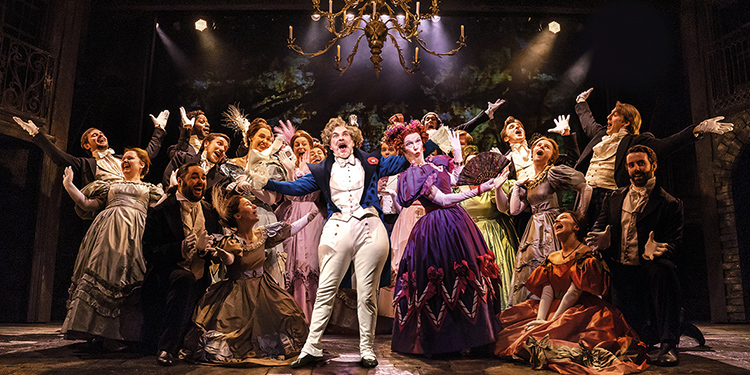
“Wedding Chorale”
Marius and Cosette marry in grand musical fashion. But the jubilation soon shifts into a familiar tune: that cunning Thenardier waltz. Yes, the criminal duo are now passing themselves off as landed gentry. Marius isn’t fooled, but he does learn a crucial bit of information from them: Valjean was the man who saved his life.
“Beggars at the Feast”
Yet more musical reprises, as the Thenardiers crow about their newfound fortune to the tune of “Master of the House”, while Valjean, watching the wedding party from the shadows, asks God to take him now – to the tune of “Bring Him Home”.
“Valjean’s Death”
Valjean finally dies to the tune of “On My Own”, while giving Cosette his last confession, and the spirits of Fantine and Eponine come to claim him. Valjean’s shiver-inducing final words sum up the show’s empathetic mission statement: “To love another person/ Is to see the face of God”.
“Do You Hear the People Sing?”
Les Mis ends on a note of defiance: the rebels might be beaten this time, but more will follow. It’s a triumphant climactic number – hard-earned but full-throated optimism. After numerous songs about relentless, unchanging toil – tomorrow just another day of the same hardship – the show ends with the promise of something better when “tomorrow comes”. Who will join in our crusade? Generations of Les Mis audiences, inspired to fight for a fairer world.
See more shows in the West End
Book Mamma Mia! tickets on London Theatre.
Book The Lion King tickets on London Theatre.
Book Wicked tickets on London Theatre.
Photo credit: Les Miserables (Photos by Johan Persson)
Frequently asked questions
What is Les Misérables about?
Do you hear the people sing? The iconic West End classic returns with a fresh staging and design. Even if you’ve seen Les Mis before, you haven’t seen it like this. This global hit tells a timeless story of redemption and revolution, complete with famous songs like “I Dreamed A Dream.” Get your tickets to Les Miserables at the Sondheim Theatre today.
How long is Les Misérables?
The running time of Les Misérables is 2hr 50min. Incl. 15min interval.
Where is Les Misérables playing?
Les Misérables is playing at Sondheim Theatre. The theatre is located at 51 Shaftesbury Avenue, London, W1D 6BA.
What's the age requirement for Les Misérables?
The recommended age for Les Misérables is Ages 7+. Children under the age of 16 must be accompanied by and sat next to an adult ticketholder (18+). Children under the age of 3 will not be admitted..
How do you book tickets for Les Misérables?
Book tickets for Les Misérables on London Theatre.
What are the songs in 'Les Misérables'?
Les Misérables is a sung-through musical featuring many classic songs like “Bring Him Home,” “Stars,” and “I Dreamed a Dream.” Read our complete guide to the songs in Les Misérables.
Who wrote 'Les Misérables'?
Les Misérables is an adaptation of Victor Hugo’s novel. The musical was written by Claude-Michel Schönberg (music) and Alain Boublil (French lyrics), with Herbert Kretzmer providing the English-language libretto.
Who directed 'Les Misérables'?
Trevor Nunn and John Caird directed Les Misérables on stage, and the duo won a Tony Award for their work on the show in 1987.
When did 'Les Misérables' open in the West End?
Les Misérables opened at the Barbican Centre on 8 October 1985, then transferred to the Palace Theatre on 4 December 1985. It later moved again to its current home at the Sondheim Theatre on 3 April 2004.
Is 'Les Misérables' appropriate for kids?
This production is suitable for children over the age of 7. An adult must accompany any children under 16, and children under 3 will not be admitted into the auditorium.
Is 'Les Misérables' good?
An epic spectacle, Les Misérables continues to leave audiences breathless after over thirty years with its beautiful score and captivating story. Read our five-star review of Les Misérables.
Is 'Les Misérables' a true story?
Whilst Les Misérables is an adaptation of Victor Hugo’s novel of the same name, this fictional work dives into the inequalities of 19th-century France, including the June Rebellion of 1832.
Is 'Les Misérables' an opera?
No, Les Misérables is not opera but is categorised as a sung-through musical. The show seamlessly weaves spoken dialogue with various musical styles to tell the story. Find out more about the songs in Les Misérables with our song guide here.
Originally published on






